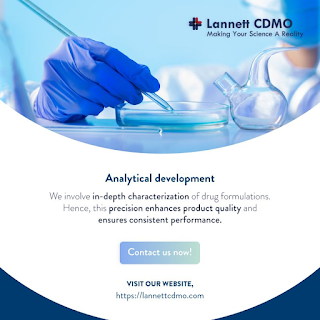Analytical Laboratory Services: Ensuring Quality and Efficacy in Pharmaceuticals
The quality and performance of pharmaceutical goods is critical in the highly regulated and competitive pharmaceutical sector. This is where analytical laboratory services come into play. These services include a variety of activities and strategies that aid in the creation and quality control of pharmaceutical formulations. In this essay, we will look at the importance of analytical laboratory services and their role in ensuring pharmaceutical product success.
Formulation Development Services: The Foundation of Drug Development
Before we dive into the critical role of analytical laboratory services, it's essential to understand the initial steps of drug development, which begin with formulation development services. Formulation development is the process of designing a pharmaceutical product that contains the active ingredient in a specific form, ensuring optimal delivery, stability, and efficacy.
During the formulation development phase, scientists work on creating the right blend of active pharmaceutical ingredients (APIs), excipients, and other components to produce a safe and effective drug product. This process requires a deep understanding of chemistry, biology, and pharmacology. The formulation developed in this phase is the precursor to the final pharmaceutical product.
Analytical Development Services: Ensuring Quality and Compliance
Once a formulation is created, the next step is to analyze and validate its quality and performance. This is where analytical development services come into play. Analytical development is a comprehensive approach to assess the quality, safety, and effectiveness of pharmaceutical products. It involves the use of advanced techniques and methodologies to characterize the formulation's chemical and physical properties.
The analytical development services include:
Method Development and Validation: Developing and validating analytical methods to measure the drug's identity, strength, quality, and purity. These methods ensure that the product meets regulatory standards.
Stability Testing: Assessing the drug product's stability over time under various conditions. This is crucial to determine shelf life and storage requirements.
Quality Control Testing: Conducting routine testing to monitor product quality and consistency during manufacturing.
Impurity Profiling: Identifying and quantifying impurities in the formulation. Controlling and minimizing impurities are essential for safety and efficacy.
Regulatory Compliance: Ensuring that the drug product complies with the stringent regulations set forth by health authorities, such as the FDA and EMA.
The Intersection of Formulation and Analytical Development
The collaboration between formulation development and analytical development services is essential for the successful development of pharmaceutical products. Formulation scientists rely on analytical data to make informed decisions about the composition and properties of the product. Analytical methods are used to characterize the raw materials and ensure their compatibility with the formulation. This synergy is crucial for creating safe, effective, and high-quality pharmaceuticals.
Moreover, analytical laboratory services also contribute to problem-solving during drug development. If issues related to stability, impurities, or product quality arise, analytical experts can investigate the root causes and propose corrective actions.
Benefits of Effective Analytical Laboratory Services
Regulatory Compliance: Pharmaceutical products must adhere to strict regulations and guidelines to ensure patient safety. Analytical development services help companies meet these regulatory requirements, which is a fundamental aspect of drug development.
Cost Savings: Early detection and resolution of issues through analytical testing can prevent costly delays and product recalls later in the development process.
Quality Assurance: By ensuring the product's consistency and quality, analytical services help build trust with healthcare providers and patients.
Optimized Formulations: Analytical data allows for fine-tuning of formulations, resulting in more effective and stable pharmaceutical products.
Innovation: Advanced analytical techniques and technologies drive innovation in drug development, enabling the creation of novel and life-changing medicines.
In conclusion, analytical laboratory services are indispensable in pharmaceutical development. They bridge the gap between formulation design and the delivery of safe and efficacious pharmaceutical products to the market. Their contribution to regulatory compliance, quality assurance, and cost-effectiveness cannot be overstated. These services are a cornerstone of the pharmaceutical industry's commitment to improving global health through innovative and high-quality medicines.


Comments
Post a Comment